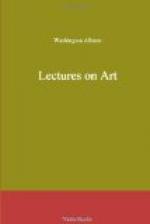Finally, we shall conclude our Discourse with a few words on the master Principle, which we have supposed to be, by the will of the Creator, the realizing life to all things fair and true and good: and more especially would we revert to its spiritual purity, emphatically manifested through all its manifold operations,—so impossible of alliance with any thing sordid, or false, or wicked,—so unapprehensible, even, except for its own most sinless sake. Indeed, we cannot look upon it as other than the universal and eternal witness of God’s goodness and love, to draw man to himself, and to testify to the meanest, most obliquitous mind,—at least once in life, be it though in childhood,—that there is such a thing as good without self. It will be remembered, that, in all the various examples adduced, in which we have endeavoured to illustrate the operation of Harmony, there was but one character to all its effects, whatever the difference in the objects that occasioned them; that it was ever untinged with any personal taint: and we concluded thence its supernal source. We may now advance another evidence still more conclusive of its spiritual origin, namely, in the fact, that it cannot be realized in the Human Being quoad himself. With the fullest consciousness of the possession of this principle, and with the power to realize it in other objects, he has still no power in relation to himself,—that is, to become the object to himself.
Now, as the condition of Harmony, so far as we can know it through its effect, is that of impletion, where nothing can be added or taken away, it is evident that such a condition can never be realized by the mind in itself. And yet the desire to this end is as evidently implied in that incessant, yet unsatisfying activity, which, under all circumstances, is an imperative, universal law of our nature.
It might seem needless to enlarge on what must be generally felt as an obvious truth; still, it may not be amiss to offer a few remarks, by way of bringing it, though a truism, more distinctly before us. In all ages the majority of mankind have been more or less compelled to some kind of exertion for their mere subsistence. Like all compulsion, this has no doubt been considered a hardship. Yet we never find, when by their own industry, or any fortunate circumstance, they have been relieved from this exigency, that any one individual has been contented with doing nothing. Some, indeed, before their liberation, have conceived of idleness as a kind of synonyme with happiness; but a short experience has never failed to prove it no less remote from that desirable state. The most offensive employments, for the want of a better, have often been resumed, to relieve the mind from the intolerable load of nothing,—the heaviest of all weights,—as it needs must be to an immortal spirit: for the mind cannot stop, except it be in a mad-house; there, indeed, it may rest, or rather stagnate, on one thought,—its




